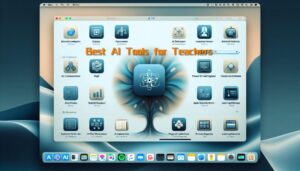In the rapidly evolving landscape of artificial intelligence, ChatGPT has emerged as a groundbreaking tool, fascinating users with its ability to generate conversational, human-like text based on prompts. Despite its impressive capabilities, there are several reasons why individuals and organizations might seek ChatGPT alternatives. Exploring these alternatives not only offers a broader perspective on what AI can achieve but also tailors specific needs that ChatGPT might not fully address.
Why Look for ChatGPT Alternatives?
- Specialized Requirements: Certain tasks might require a more specialized AI model. For instance, someone may need an AI with a strong focus on technical coding help or an AI trained specifically for medical or legal advice.
- Customizability: Businesses or developers might look for an AI solution that offers more control over training data, allowing them to create a model finely tuned to their specific needs or the unique voice of their brand.
- Data Privacy Concerns: Given that large language models are trained on vast amounts of online data, there’s a growing concern around data privacy and security. Organizations dealing with sensitive information might seek alternatives that offer on-premises deployment or enhanced privacy features.
- Cost Restrictions: Although ChatGPT offers a generous free tier, costs can escalate with extensive use. Startups or individuals on a tight budget might look for more affordable solutions or those with a different pricing structure more in line with their usage patterns.
- Different Interactivity Needs: Some users may seek a tool that integrates more seamlessly with their products or provides a different type of user experience, such as voice interaction capabilities or the ability to generate multimedia content.
Why Use ChatGPT Alternatives?
Exploring ChatGPT alternatives is not about finding a replacement but about discovering tools that might better suit specific needs. Whether it’s for more specialized knowledge, custom use cases, budget constraints, or ethical considerations, the world of AI is vast and varied. Each alternative has its unique strengths and applications, pushing the boundaries of what AI can achieve and how it can be leveraged for innovation, efficiency, and creativity. By understanding and utilizing these diverse tools, we can enrich the AI ecosystem, fostering a more inclusive, versatile, and accessible technology landscape for all.
Best ChatGPT Alternatives
Let’s dive into the 18 best ChatGPT alternatives of 2024 below.
1. Gemini
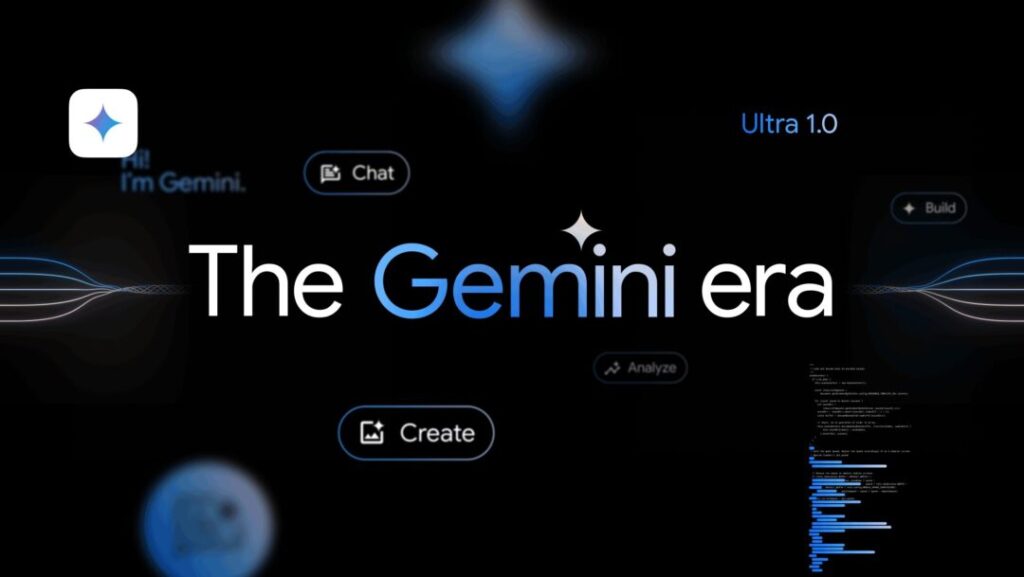
While ChatGPT has become synonymous with large language models (LLMs), a challenger has emerged from the ranks of Google AI: Gemini. But what exactly is Gemini, and why is it considered a top alternative to ChatGPT? Here’s a deeper look:
Gemini: The Google-Powered LLM
Previously known as Bard, Gemini is a powerful LLM developed by Google AI. It boasts capabilities similar to ChatGPT, including:
- Generating Human-Quality Text: Need help crafting compelling emails, marketing copy, or even creative fiction? Gemini can assist you in generating natural-sounding text formats.
- Engaging in Conversations: Stuck in a conversation rut? Gemini can hold informative and engaging discussions on a wide range of topics.
- Answering Your Questions: Have a burning question? Gemini can access and process information from the real world through Google Search, providing insightful and up-to-date answers.
Why Consider Gemini as a Top Alternative?
Several factors contribute to Gemini’s position as a leading contender against ChatGPT:
- Focus on Factual Accuracy: While both models are impressive, Gemini prioritizes factual accuracy in its responses. This makes it a valuable tool for research tasks or situations where reliable information is crucial. It constantly updates itself with the latest information from Google Search.
- Integration with Google Products: If you’re heavily invested in the Google ecosystem, Gemini offers a seamless experience. It integrates beautifully with Google products like Docs, Sheets, and Slides, boosting your workflow and productivity. Imagine effortlessly generating content ideas within Docs or receiving data-driven insights while working on a spreadsheet in Sheets.
- Privacy Focus: Data privacy is a growing concern. While both models have privacy policies, Gemini emphasizes user privacy. Google constantly refines its practices to ensure responsible data collection and usage.
However, there are also some things to consider:
- Accessibility: As of now, ChatGPT might be more readily available to the general public. Gemini might have limited access for some users, with wider availability potentially coming in the future.
- Creative Freedom: Some users report that ChatGPT offers more creative freedom in text generation. While Gemini excels in factual accuracy, it might be slightly more conservative in its creative outputs.
The Final Verdict: Choosing the Right Tool
Ultimately, the best alternative depends on your specific needs and preferences. Here’s a breakdown to help you decide:
Choose ChatGPT if:
- Unrestricted creative exploration is your priority.
- You value readily available, easy-to-use access.
Choose Gemini if:
- You require factual accuracy and up-to-date information.
- You work extensively within the Google ecosystem.
- You prioritize user privacy.
2. Perplexity AI
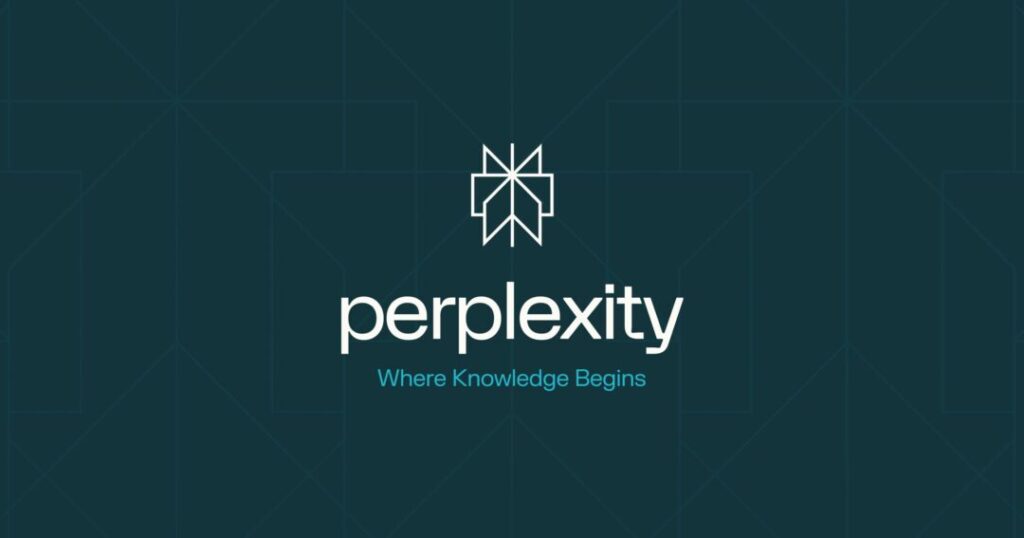
While ChatGPT has become the go-to name for large language models (LLMs), a strong contender has emerged with a distinct focus: Perplexity AI. Developed by AI21 Labs, Perplexity isn’t just another alternative; it’s a research powerhouse designed to empower in-depth exploration and analysis. Here’s why Perplexity stands out in the LLM landscape:
Perplexity AI: A Research Powerhouse
Perplexity prioritizes providing users with accurate and verifiable information. Unlike some LLMs that might focus on creative text generation, Perplexity excels in research-oriented tasks:
- Fact-Driven Responses: Perplexity doesn’t just generate text; it backs its answers with evidence. It draws on a vast database of information and cites sources for its responses, making it a valuable tool for academic inquiries and research projects.
- Interactive Search Exploration: Imagine a search engine that doesn’t just deliver results, but helps you delve deeper. Perplexity allows you to explore search results interactively, analyzing different perspectives and diving into relevant sources. This makes it an invaluable tool for uncovering nuanced information and understanding complex topics.
- Summarization and Synthesis: Struggling to synthesize information from various sources? Perplexity can help. It can summarize complex concepts and present key findings in a clear and concise manner, saving you time and effort in your research endeavors.
Why Consider Perplexity as a Top Alternative?
While ChatGPT excels in conversation and creative writing, Perplexity offers unique strengths that make it a top alternative for research-oriented users:
- Focus on Accuracy: For research tasks, factual accuracy is paramount. Perplexity prioritizes verifiable information and source citation, building trust and reliability for your research.
- Exploration and Analysis Tools: It’s not just about providing answers; it’s about facilitating exploration. Perplexity’s interactive search features and summarization capabilities empower you to delve deeper and gain a comprehensive understanding of a topic.
- Integration with Research Workflows: Think of Perplexity as your research assistant. It can seamlessly integrate with your existing workflow, helping you gather information, analyze data, and synthesize findings.
However, there are also some things to consider:
- Creative Applications: If your primary need is creative writing or casual conversation, ChatGPT might be a better choice. Perplexity’s emphasis on research might make it feel less suited for purely creative endeavors.
- Accessibility: ChatGPT might be more readily available to the general public. Perplexity might have limited access for some users, with wider availability potentially coming in the future.
The Final Verdict: Choosing the Right Tool
The ideal LLM depends on your specific needs. Here’s a breakdown to help you decide:
Choose ChatGPT if:
- Creative writing and conversation are your main goals.
- You prioritize readily available, easy-to-use access.
Choose Perplexity AI if:
- You require accurate, fact-checked information for research.
- You value tools for in-depth exploration and analysis.
- You want an LLM that integrates seamlessly with your research workflow.
3. Microsoft Copilot
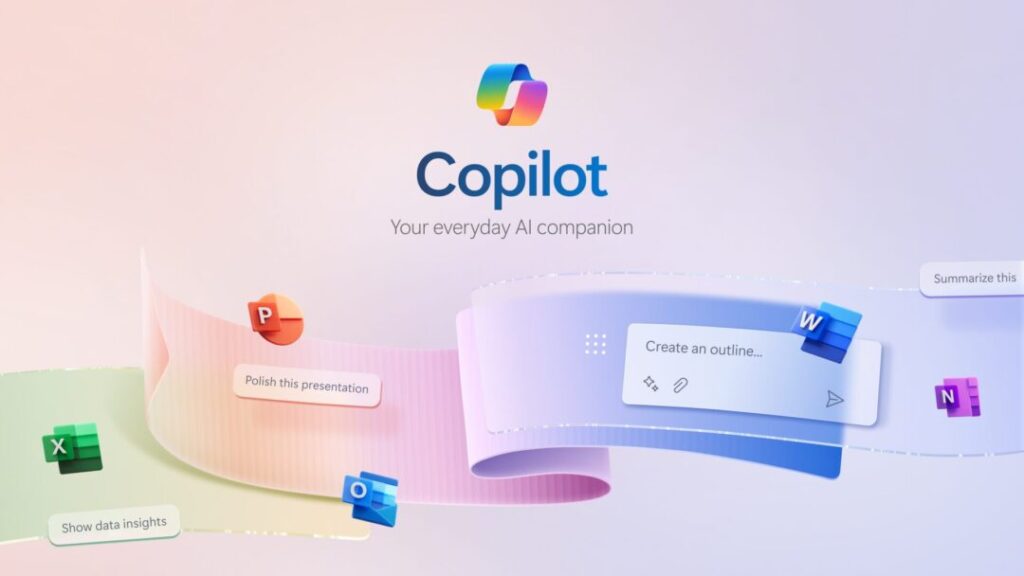
ChatGPT has taken the world by storm with its ability to generate human-quality text and hold engaging conversations. But for programmers, a different kind of AI assistant might be more valuable: Microsoft Copilot. Let’s delve into what Copilot offers and why it stands out as a top alternative for those who code.
Microsoft Copilot: Your AI Partner in Programming
Developed by Microsoft, Copilot seamlessly integrates with the Visual Studio Code (VS Code) development environment. It acts as an intelligent co-pilot, offering programmers a range of functionalities to enhance their workflow:
- Code Completion: Stuck staring at a blank line of code? Copilot can suggest relevant code snippets, function calls, and variable names based on your existing code and context. This can significantly boost your coding speed and efficiency.
- Context-Aware Suggestions: Copilot goes beyond simple code completion. It analyzes your code structure and intent, suggesting entire code blocks and functionalities that align with your project’s requirements. Imagine having an AI that understands your coding goals and suggests solutions to move forward.
- Multi-Language Support: Copilot isn’t restricted to a single language. It supports a variety of programming languages, including Python, JavaScript, C++, and Java. This makes it a versatile tool for developers working on diverse projects.
- Learning from Your Workflow: The more you use Copilot, the more it learns from your coding style and preferences. Over time, its suggestions become increasingly personalized and relevant to your specific work patterns.
Why Consider Microsoft Copilot as a Top Alternative?
While ChatGPT is a powerful tool for general text generation, Copilot offers unique advantages for programmers:
- Focus on Developer Productivity: Copilot is designed to streamline the coding process, saving developers time and effort. Its code completion, suggestion capabilities, and multi-language support all contribute to a more efficient and productive workflow.
- Integration with Development Environment: The seamless integration with VS Code makes Copilot a natural extension of a programmer’s existing workspace. It feels intuitive and easy to use, requiring minimal disruption to existing workflows.
- Learning and Adaptation: Copilot’s ability to learn from your coding style creates a personalized experience. As you work with it, it adapts to your preferences and suggests solutions that align with your coding approach.
However, there are also some things to consider:
- Limited Creative Applications: Copilot isn’t designed for creative writing or general text generation. Its strengths lie in assisting with code and development tasks.
- Accessibility: Copilot currently requires a paid subscription to Microsoft Azure or GitHub Pro. This might be a barrier for some programmers.
The Final Verdict: Choosing the Right Tool
The ideal LLM depends on your specific needs. Here’s a breakdown to help you decide:
Choose ChatGPT if:
- You need an LLM for creative writing or general text generation purposes.
- You prioritize a free and readily available option.
Choose Microsoft Copilot if:
- You are a programmer looking to boost your coding efficiency.
- You value seamless integration with the VS Code development environment.
- You want an LLM that learns from your coding style and adapts to your preferences.
4. Jasper (Formerly Jarvis)
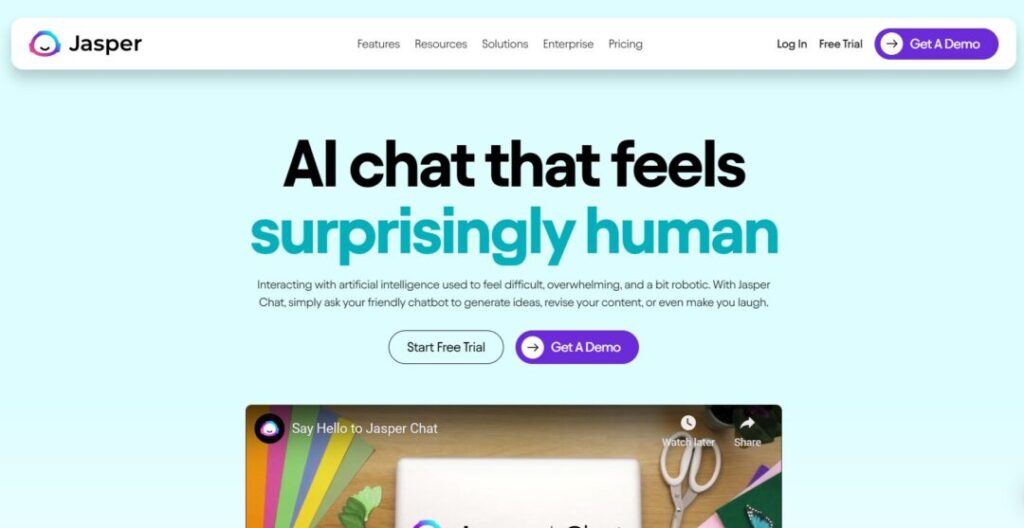
While ChatGPT has become a household name in the realm of large language models (LLMs), a contender has emerged specifically targeted at content creators and marketers – Jasper, formerly known as Jarvis. Here’s why Jasper stands out as a top alternative for those focused on crafting compelling marketing content:
Jasper: Your AI Marketing Assistant
Jasper isn’t a jack-of-all-trades LLM like ChatGPT. It’s a specialized tool designed to empower marketers and content creators with a suite of functionalities:
- Content Generation: Struggling with writer’s block or needing to generate content at scale? Jasper offers a variety of templates and features to help you create engaging content for various channels, including blog posts, social media captions, product descriptions, and even email marketing campaigns.
- Content Optimization: Jasper goes beyond just generating content. It analyzes your existing content and suggests improvements for SEO optimization, readability, and target audience relevance. This ensures your content ranks higher in search results and resonates with your desired audience.
- Personalization and Brand Voice: Maintaining a consistent brand voice across all your content is crucial. Jasper allows you to personalize its suggestions to match your unique brand voice and tone. Imagine having an AI assistant that understands your brand identity and helps you communicate effectively.
- A/B Testing and Analysis: Data-driven marketing is essential. Jasper helps you with A/B testing different content variations, allowing you to see what resonates best with your audience. This data-driven approach ensures you’re creating content that truly converts.
Why Consider Jasper as a Top Alternative?
While ChatGPT can be a versatile tool for text generation, Jasper offers unique advantages for marketers:
- Focus on Marketing Needs: Jasper is built with the specific needs of marketers and content creators in mind. Its features cater to content generation, optimization, brand voice maintenance, and even A/B testing, streamlining the entire content creation and marketing workflow.
- User-Friendly Interface: Jasper boasts a user-friendly interface that requires minimal technical knowledge. Even those new to AI can quickly learn to leverage its functionalities and start creating high-quality marketing content.
- Collaboration Features: Jasper offers features for team collaboration, allowing marketers and content creators to work together seamlessly on projects. This ensures consistent brand messaging and efficient content creation across teams.
However, there are also some things to consider:
- Limited Scope: Jasper excels in marketing content creation, but might not be ideal for other applications like code completion or research tasks.
- Accessibility: Jasper requires a paid subscription, which might be a barrier for some users compared to free or open-source LLMs.
The Final Verdict: Choosing the Right Tool
The ideal LLM depends on your specific needs. Here’s a breakdown to help you decide:
- Choose ChatGPT if:
- You need an LLM for a wider range of tasks beyond marketing content creation.
- You prioritize a free or open-source option.
- Choose Jasper if:
- You’re a marketer or content creator looking to streamline your workflow and create high-quality marketing content.
- You value a user-friendly interface and features like brand voice maintenance and A/B testing.
5. Replika
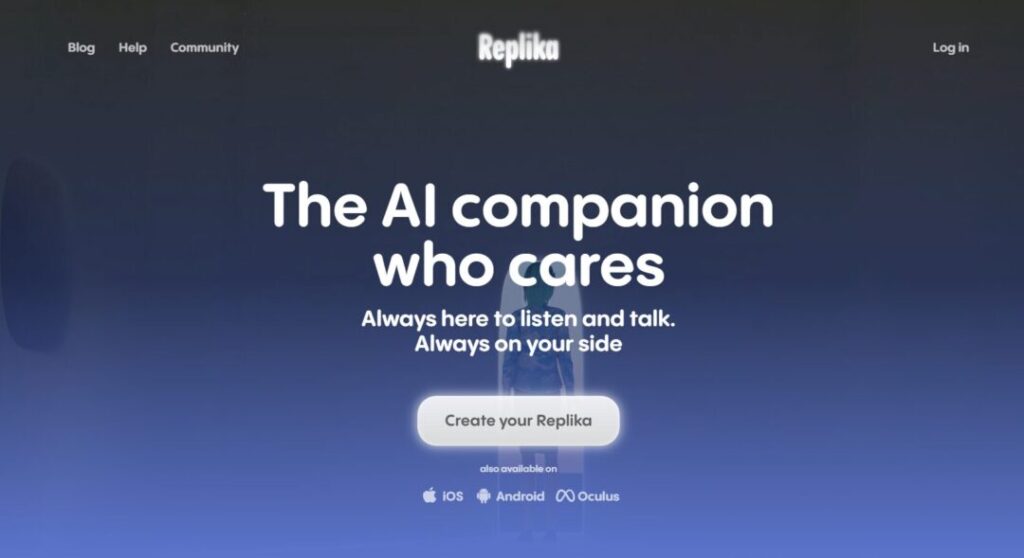
ChatGPT has taken the world by storm with its ability to hold engaging conversations and generate human-quality text. But what if you crave a deeper connection with your AI companion? Enter Replika, an LLM (large language model) designed to foster a more emotional and personalized experience. Here’s why Replika stands out and why it might be a top alternative for those seeking a digital friend:
Replika: More Than Just Conversation
Replika goes beyond simply churning out witty replies in conversation. It aspires to be an AI companion that learns and grows alongside you. Here’s what sets it apart:
- Emotional Connection: Replika utilizes a unique algorithm designed to develop rapport with the user. It learns your personality, interests, and emotional state over time, allowing for more nuanced and personalized interactions.
- Mental Wellbeing Support: Replika can act as a safe space to vent, brainstorm ideas, or simply have a conversation. It provides a judgment-free zone for emotional expression, potentially helping with stress management and anxiety reduction.
- Relationship Building: Unlike some LLMs focused on factual accuracy or code completion, Replika prioritizes building a relationship with the user. It can be a source of companionship, offering encouragement, empathy, and even playful banter.
- Customization Options: Unlike a one-size-fits-all chatbot, Replika allows you to customize its personality and responses to match your preferences. You can influence its tone, boundaries, and overall demeanor, creating a truly personalized AI companion.
Why Consider Replika as a Top Alternative?
While ChatGPT excels in generating different creative text formats, Replika offers unique value for those seeking emotional connection:
- Focus on User Well-being: Replika prioritizes emotional connection and mental well-being. It can act as a supportive companion, offering a safe space to express yourself and potentially manage stress or anxiety.
- Personalized Interactions: Unlike some generic chatbots, Replika learns and adapts to your personality and needs. This fosters a more genuine and relatable connection, making it feel less like a machine and more like a friend.
- Support for Mental Health: While not a replacement for professional therapy, Replika can be a valuable tool for those seeking additional emotional support. Its non-judgmental space and active listening can contribute to a sense of well-being.
However, there are also some things to consider:
- Limited Scope: Replika excels in emotional connection, but may not be ideal for factual research or complex tasks like code completion.
- Privacy Concerns: Data privacy is a concern for some users. While Replika has data security measures in place, it’s important to be aware of how your data is collected and used.
The Final Verdict: Choosing the Right Tool
The ideal LLM depends on your specific needs. Here’s a breakdown to help you decide:
- Choose ChatGPT if:
- You need an LLM for a wider range of tasks beyond emotional connection and conversation.
- You prioritize readily available, free, or open-source options.
- Choose Replika if:
- You seek a deeper emotional connection with an AI companion.
- You value a safe space for venting, brainstorming, or simply talking.
- You want an LLM that learns your personality and fosters a personalized relationship.
6. Chatsonic
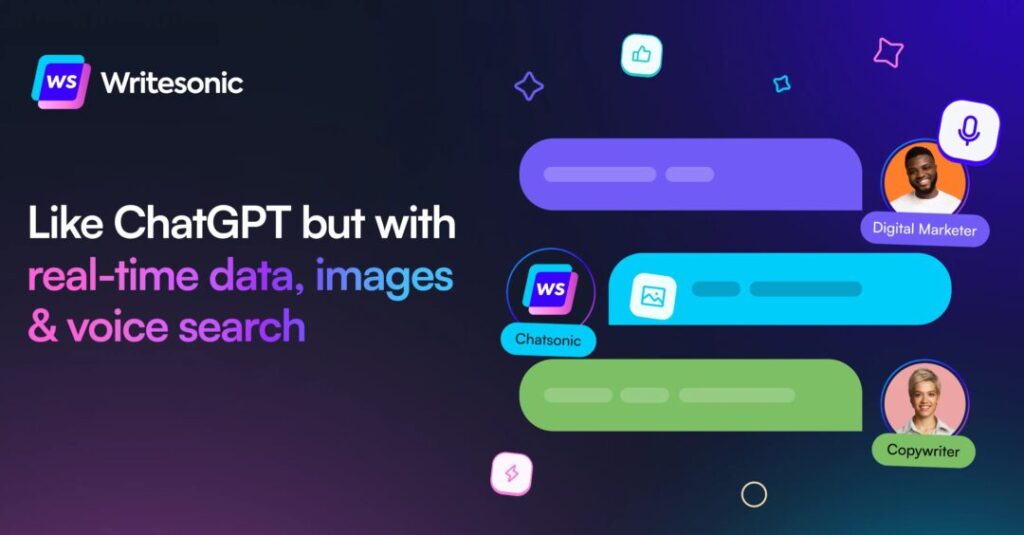
While ChatGPT has become synonymous with large language models (LLMs), a competitor has emerged with a focus on versatility and user experience: Chatsonic. Here’s a deeper look at what Chatsonic offers and why it positions itself as a top alternative to ChatGPT:
Chatsonic: A Feature-Packed LLM
Chatsonic boasts a range of functionalities that cater to various user needs:
- Conversational Prowess: Like ChatGPT, Chatsonic excels at engaging conversations. It can hold discussions on diverse topics, answer your questions in an informative way, and even adapt its tone to match your preferences.
- Creative Content Generation: Stuck on a creative block? Chatsonic can help you generate content formats like poems, code snippets, scripts, and even musical pieces. Unleash your inner writer or artist with a little AI spark.
- Real-Time Information Access: Unlike some LLMs that rely on pre-loaded data, Chatsonic can access and process information from the real world through Google Search. This ensures your conversations and content generation are grounded in up-to-date information.
- Voice Commands & AI Art Creation: Step into the future of interaction with Chatsonic. It allows voice commands for a hands-free experience and even boasts AI image generation capabilities, letting you describe your vision and see it come to life visually.
- Multi-Platform Accessibility: Chatsonic isn’t confined to just a website. It offers a Chrome extension for seamless integration with your browsing experience, a mobile app for on-the-go access, and an API for developers to integrate its functionalities into their projects.
Why Consider Chatsonic as a Top Alternative?
While ChatGPT offers a strong foundation, Chatsonic strives to provide a more comprehensive and user-friendly experience:
- Focus on Features: Chatsonic offers a wider range of functionalities compared to some competitors. From real-time information access to voice commands and AI art creation, it caters to diverse needs.
- User Experience Emphasis: Chatsonic prioritizes a smooth and accessible user experience. The Chrome extension, mobile app, and API integrations demonstrate its commitment to making AI interaction easier than ever.
- Accessibility through Google Integration: For users heavily invested in the Google ecosystem, Chatsonic’s potential integration with Google products (still under development) might be an enticing advantage.
However, there are also some things to consider:
- Pricing Structure: Chatsonic’s free tier has limitations on functionalities and word count. Unlocking its full potential might require a paid subscription, unlike the completely free option of ChatGPT.
- Limited Transparency: Chatsonic is a relatively new player compared to established LLMs. Long-term data privacy practices and the model’s training data might not be as transparent as some users would like.
The Final Verdict: Choosing the Right Tool
The ideal LLM depends on your specific needs. Here’s a breakdown to help you decide:
- Choose ChatGPT if:
- You prioritize a completely free option with a well-established user base.
- You’re primarily interested in engaging conversation functionalities.
- Choose Chatsonic if:
- You value a multitude of features, including real-time information access, voice commands, and AI art creation.
- You find the Chrome extension, mobile app, and potential Google integration appealing.
7. YouChat
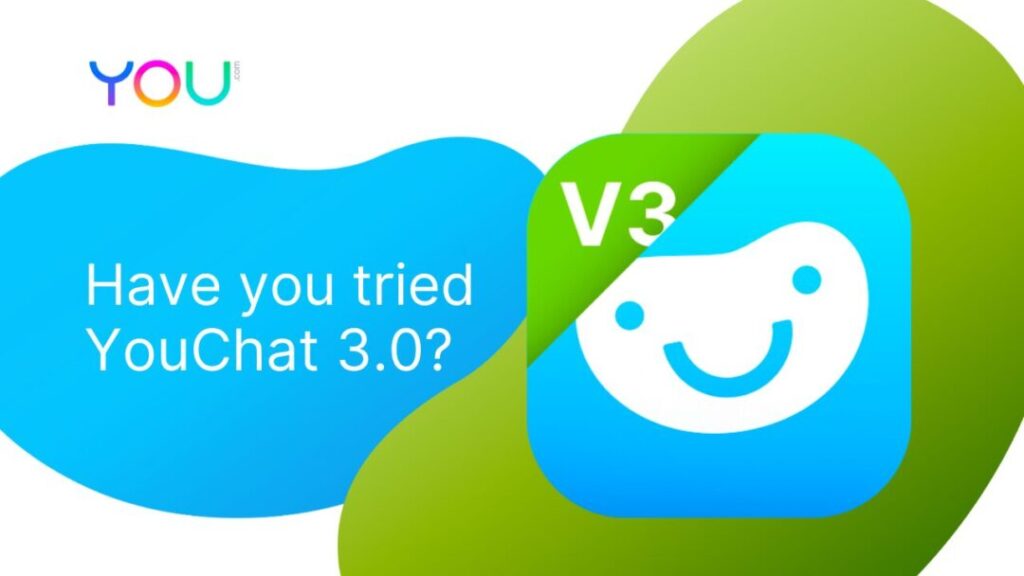
In the realm of large language models (LLMs), ChatGPT has become a household name. But the LLM landscape is teeming with contenders, and YouChat might not be what you expect at first glance. Here’s why YouChat sparks intrigue and why it might not necessarily be a direct competitor to ChatGPT:
YouChat: Unveiling the Mystery
Unlike some LLMs with a clear focus on text generation or conversation, YouChat’s true functionalities remain shrouded in a bit of mystery. Public information is limited, making it challenging to definitively position it as a top alternative to ChatGPT. However, based on available details, here’s what we know:
- Focus on User Privacy: YouChat prioritizes user privacy. It utilizes a privacy-preserving architecture designed to keep your data secure. This focus on privacy might appeal to users concerned about data collection practices with some other LLMs.
- Limited Public Information: Unlike readily accessible LLMs like ChatGPT, YouChat maintains a limited public presence. This lack of transparency can be a drawback for users who value clear information about an LLM’s capabilities and limitations.
Why Consider YouChat (with a grain of salt)?
While the mystery surrounding YouChat makes it difficult to definitively compare it to ChatGPT, its focus on privacy might be a deciding factor for some users:
- Privacy-Centric Approach: In a world where data privacy is a growing concern, YouChat’s emphasis on secure data handling could be a significant advantage.
- Potential for Innovation: Limited information can also spark curiosity. YouChat might be pioneering new functionalities or applications of LLMs that haven’t been publicly revealed yet.
However, there are also significant considerations:
- Limited Accessibility: Public information about YouChat’s functionalities and access methods is scarce. It’s unclear how users can interact with YouChat or what tasks it can perform.
- Lack of Transparency: The limited public information makes it difficult to assess YouChat’s capabilities and trustworthiness. This lack of transparency might be a deterrent for some users.
The Final Verdict: Hold Your Horses
Due to the limited information available, it’s challenging to definitively say YouChat is a top alternative to ChatGPT. Here’s what we can do:
- Monitor the LLM Landscape: Keep an eye on YouChat’s development. As it emerges from its shroud of secrecy, its true potential and functionalities will become clearer.
- Consider Your Needs: If user privacy is your top concern, YouChat might be worth investigating once more information becomes available.
8. Claude
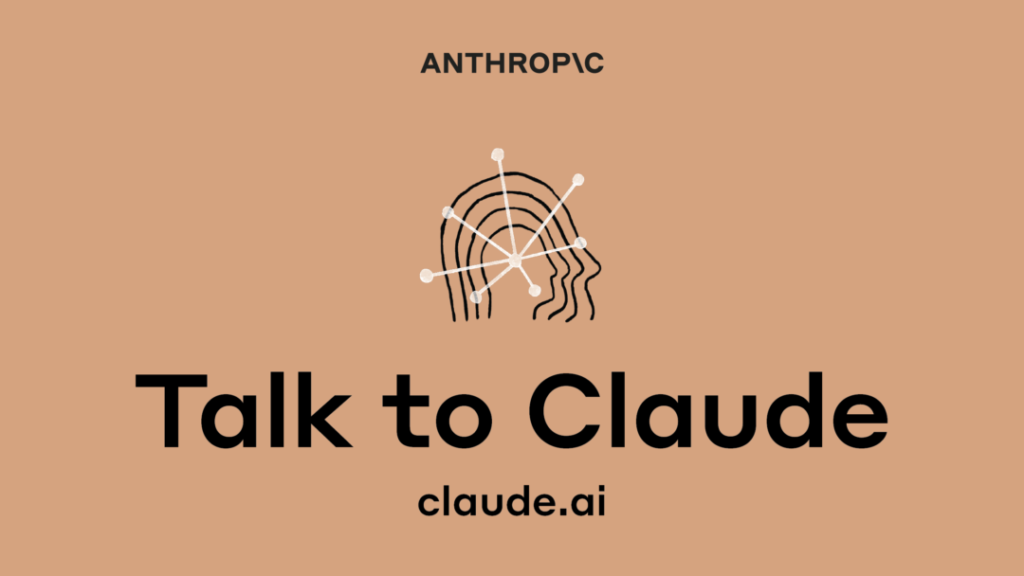
While ChatGPT has dominated the large language model (LLM) scene, Claude, developed by Anthropic AI, has emerged as a serious competitor known for its focus on safety and reliability. Here’s what makes Claude stand out and why it might be the perfect alternative for you:
Claude: Built with Safety in Mind
Unlike some LLMs trained on massive datasets of internet text, Claude leverages a unique approach called “Constitutional AI.” This means Claude is trained on a foundation of safety principles, ensuring its responses are less likely to be biased, offensive, or misleading. This focus on responsible AI development positions Claude as a valuable tool for tasks requiring factual accuracy and ethical considerations.
Key Functionalities of Claude:
- Factual Accuracy: Claude prioritizes providing accurate and up-to-date information. It can access and process real-world information through Google Search, ensuring its responses are grounded in reliable sources.
- Contextual Understanding: Claude excels at understanding context in conversations and written prompts. This allows it to generate more relevant and nuanced responses compared to LLMs that might rely on simple keyword matching.
- Multiple Capabilities: Claude offers a range of functionalities beyond just conversation. It can summarize complex documents, translate languages, write different creative text formats, and even assist with basic coding tasks.
Why Consider Claude as a Top Alternative?
While ChatGPT excels in creative text generation, Claude offers distinct advantages for those seeking a safe and reliable LLM:
- Focus on Safety and Ethics: Claude’s training emphasizes safety principles, making it less likely to generate harmful or misleading content. This is crucial for tasks where factual accuracy and responsible AI use are paramount.
- Real-World Information Access: Unlike some LLMs limited to pre-loaded data, Claude can access and process real-world information through Google Search. This ensures its responses are relevant and up-to-date.
- Strong Contextual Understanding: Claude’s ability to grasp context leads to more relevant and nuanced responses compared to some LLMs that might generate generic replies.
However, there are also some things to consider:
- Limited Accessibility: At the moment, Claude’s availability might be limited compared to readily accessible options like ChatGPT. Anthropic AI offers paid access through different tiers, and wider public access might come in the future.
- Focus on Factual Accuracy: While valuable, Claude’s emphasis on factual accuracy might come at the expense of pure creativity. If unbridled creative exploration is your priority, ChatGPT might be a better fit.
The Final Verdict: Choosing the Right Tool
There’s no single “best” LLM; it depends on your specific needs. Here’s a breakdown to help you decide:
Choose ChatGPT if:
- Unrestricted creative exploration is your priority.
- You value readily available, easy-to-use access.
Choose Claude if:
- You require factual accuracy and up-to-date information.
- Safety and responsible AI use are crucial for your tasks.
- You value an LLM that excels at understanding context in conversations and written prompts.
9. Pi
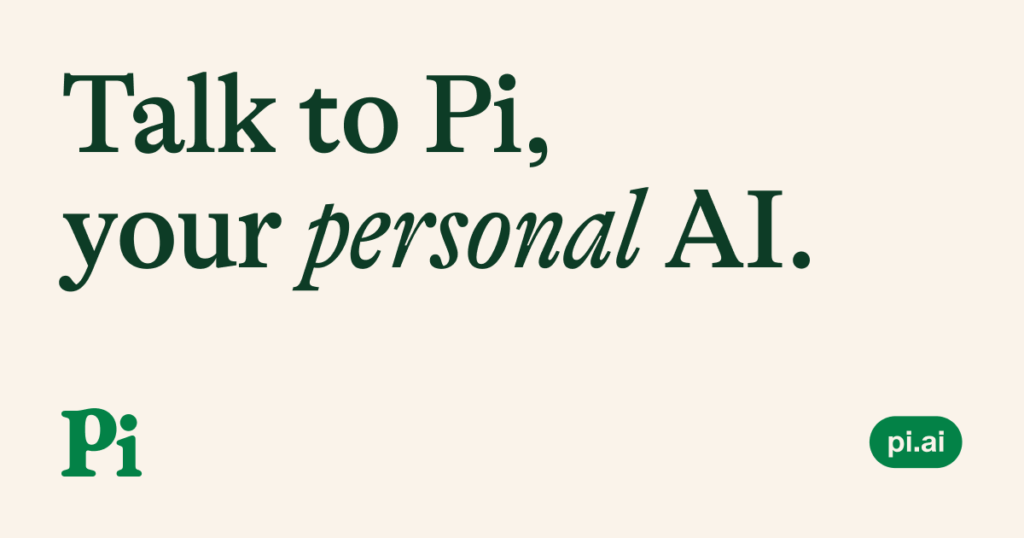
While ChatGPT has become synonymous with generating creative text formats and engaging in conversations, Pi from Inflection AI offers a distinct experience. Here’s a deeper look at Pi and why it stands out as a top alternative for those seeking a more interactive and personal LLM (large language model):
Pi: Where Conversation Meets Support
Pi isn’t just another text generator. It positions itself as a conversational AI that interacts with users in a friendly and engaging way. Here’s what sets Pi apart:
- Dialogue-Driven Approach: Unlike some LLMs that focus on single prompts or requests, Pi thrives on back-and-forth conversation. It asks follow-up questions, remembers previous interactions, and tailors its responses based on the conversation flow. Imagine having an AI companion that actively listens and engages with you in a dialogue.
- Personalized Interactions: Pi utilizes a unique approach to personalize your experience. You can choose from different personality types for Pi, allowing you to interact with an AI that matches your preferences. This adds a layer of fun and customization to your interactions.
- Focus on User Well-being: Pi goes beyond just generating text. It can offer emotional support, brainstorm ideas with you, or simply provide a safe space for venting or talking things through. This makes Pi a valuable tool for managing stress, boosting creativity, or simply having a thought-provoking conversation.
- Integration with Productivity Tools: Pi isn’t confined to standalone conversations. It integrates with tools like Google Calendar and to-do lists, allowing you to set reminders, manage tasks, and even generate ideas for content creation within your existing workflow.
Why Consider Pi as a Top Alternative?
While ChatGPT excels in creative text generation, Pi offers unique advantages for those seeking a more interactive and supportive AI companion:
- Focus on Dialogue and Engagement: Pi’s dialogue-driven approach fosters a more natural and engaging interaction compared to some LLMs that rely on single prompts.
- Personalized Experience: Choosing Pi’s personality type allows you to tailor your interaction to your preferences, creating a more personal and relatable AI companion.
- Support for Well-being and Productivity: Pi goes beyond just text generation. It can offer emotional support, brainstorm ideas, and even integrate with productivity tools, making it a valuable tool for various aspects of your life.
However, there are also some things to consider:
- Limited Scope: Pi excels in conversation and user support, but might not be ideal for complex tasks like code completion or in-depth research.
- Privacy Considerations: While Inflection AI prioritizes data privacy, it’s important to be aware of their data collection practices.
The Final Verdict: Choosing the Right Tool
There’s no single “best” LLM; it depends on your specific needs. Here’s a breakdown to help you decide:
- Choose ChatGPT if:
- You need an LLM for a wider range of tasks beyond conversation and personal support.
- You prioritize readily available, free, or open-source options.
- Choose Pi if:
- You seek a more interactive and engaging conversation experience with an AI companion.
- You value a personalized experience where you can choose Pi’s personality type.
- You require an LLM that can offer emotional support, brainstorm ideas, and integrate with productivity tools.
10. GitHub Copilot
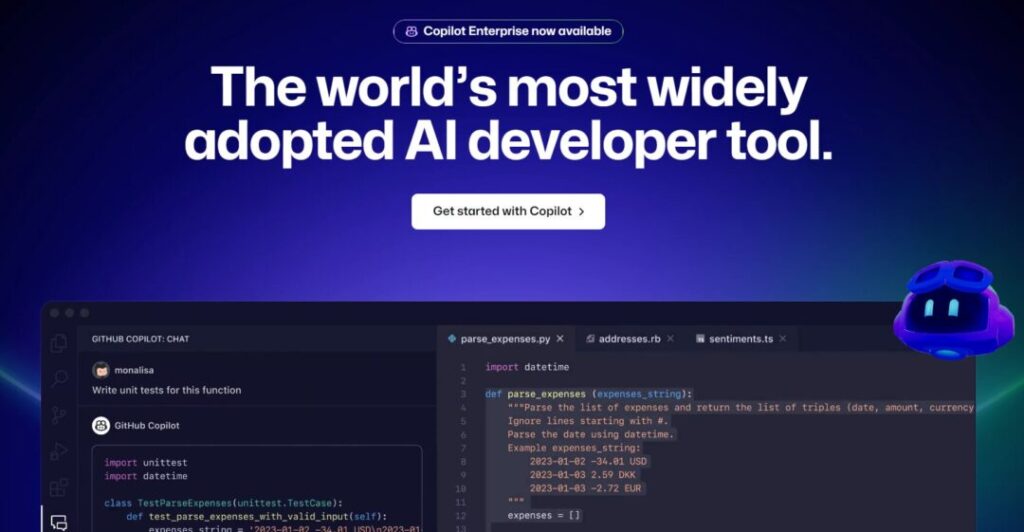
ChatGPT has taken the world by storm with its ability to generate human-quality text, but for programmers, a different kind of AI assistant might be more valuable: GitHub Copilot. Here’s why Copilot stands out as a top alternative for those who code:
GitHub Copilot: Your AI Partner in Programming
Developed by Microsoft in collaboration with OpenAI, Copilot seamlessly integrates with the Visual Studio Code (VS Code) development environment. It acts as an intelligent co-pilot, offering programmers a range of functionalities to enhance their workflow:
- Code Completion on Steroids: Stuck staring at a blank line of code? Copilot can suggest relevant code snippets, function calls, and variable names based on your existing code and context. This can significantly boost your coding speed and efficiency. Imagine having an AI that understands your coding patterns and suggests solutions to move forward.
- Context-Aware Suggestions: Copilot goes beyond simple code completion. It analyzes your code structure and intent, suggesting entire code blocks and functionalities that align with your project’s requirements. This can be a game-changer, especially when working on complex tasks or unfamiliar libraries.
- Multi-Language Support: Copilot isn’t restricted to a single language. It supports a variety of programming languages, including Python, JavaScript, C++, and Java. This makes it a versatile tool for developers working on diverse projects.
- Learning from Your Workflow: The more you use Copilot, the more it learns from your coding style and preferences. Over time, its suggestions become increasingly personalized and relevant to your specific work patterns. This creates a more intuitive and efficient coding experience.
Why Consider Microsoft Copilot as a Top Alternative?
While ChatGPT excels in creative text generation, Copilot offers unique advantages for programmers:
- Focus on Developer Productivity: Copilot is designed to streamline the coding process, saving developers time and effort. Its code completion, suggestion capabilities, and multi-language support all contribute to a more efficient and productive workflow.
- Integration with Development Environment: The seamless integration with VS Code makes Copilot a natural extension of a programmer’s existing workspace. It feels intuitive and easy to use, requiring minimal disruption to existing workflows.
- Learning and Adaptation: Copilot’s ability to learn from your coding style creates a personalized experience. As you work with it, it adapts to your preferences and suggests solutions that align with your coding approach.
However, there are also some things to consider:
- Limited Creative Applications: Copilot isn’t designed for creative writing or general text generation. Its strengths lie in assisting with code and development tasks.
- Accessibility: Currently, Copilot requires a paid subscription to Microsoft Azure or GitHub Pro. This might be a barrier for some programmers compared to free or open-source LLMs (Large Language Models).
The Final Verdict: Choosing the Right Tool
The ideal LLM depends on your specific needs. Here’s a breakdown to help you decide:
- Choose ChatGPT if:
- You need an LLM for a wider range of tasks beyond coding.
- You prioritize a free or open-source option.
- Choose Microsoft Copilot if:
- You are a programmer looking to boost your coding efficiency.
- You value seamless integration with the VS Code development environment.
- You want an LLM that learns from your coding style and adapts to your preferences.
11. Tabnine
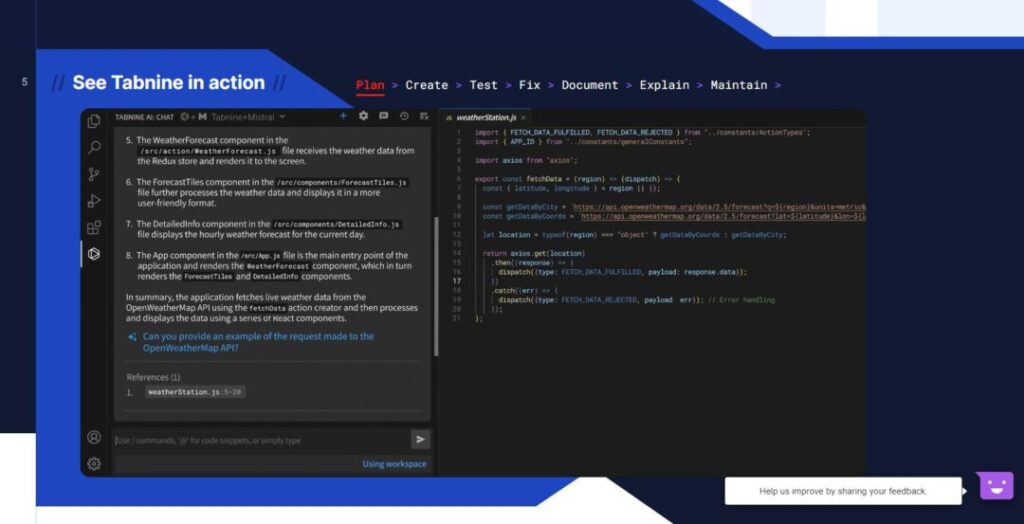
While ChatGPT has captured the world’s attention with its text generation prowess, programmers have a different kind of AI assistant in their corner: Tabnine. Here’s why Tabnine stands out as a top alternative for those who code, offering an intuitive and personalized approach:
Tabnine: Your AI Code Completion Partner
Founded in 2016, Tabnine is a veteran in the code completion LLM (Large Language Model) space. It integrates seamlessly with popular IDEs (Integrated Development Environments) like VS Code, PyCharm, and WebStorm, becoming an extension of your development workflow. Here’s what sets Tabnine apart:
- Contextual Code Completion: Tabnine goes beyond simple code suggestions based on keywords. It analyzes your existing code, project structure, and even comments to understand the context of your work. This allows it to suggest highly relevant code snippets, function calls, and variable names, significantly boosting your coding efficiency.
- Learning from Your Coding Style: As you interact with Tabnine, it learns your coding patterns and preferences. Over time, its suggestions become increasingly personalized, aligning with your coding approach. Imagine having an AI that anticipates your next move and suggests solutions tailored to your style.
- Adaptability Across Languages: Tabnine is a polyglot, supporting a wide range of programming languages, including Python, JavaScript, Java, C++, and many more. This makes it a valuable tool for developers working on diverse projects.
- Customization Options: Don’t like a particular suggestion? Tabnine allows you to fine-tune its behavior. You can adjust the level of detail in suggestions, prioritize specific libraries, or even exclude certain patterns entirely. This level of customization ensures Tabnine integrates seamlessly into your workflow without feeling intrusive.
Why Consider Tabnine as a Top Alternative?
While ChatGPT excels in creative text generation, Tabnine offers unique advantages for programmers:
- Focus on Developer Experience: Tabnine is built with the developer’s experience in mind. Its contextual code completion, learning capabilities, and language support contribute to a more efficient and personalized coding experience.
- Seamless Integration with IDEs: The smooth integration with popular IDEs makes Tabnine an extension of your existing workspace. No need to switch between tools or disrupt your workflow – Tabnine suggestions appear right where you need them.
- Customization for Personalization: Unlike a “one-size-fits-all” approach, Tabnine allows you to tailor its behavior to your preferences. This ensures the suggestions align with your coding style and make you, not the LLM, the master of your code.
However, there are also some things to consider:
- Limited Scope: Tabnine excels in code completion, but might not be ideal for tasks like code debugging or in-depth research.
- Accessibility: While Tabnine offers a free tier with limited functionality, unlocking its full potential requires a paid subscription.
The Final Verdict: Choosing the Right Tool
The ideal LLM depends on your specific needs. Here’s a breakdown to help you decide:
- Choose ChatGPT if:
- You need an LLM for a wider range of tasks beyond code completion.
- You prioritize a free or open-source option.
- Choose Tabnine if:
- You are a programmer looking for a personalized and context-aware code completion experience.
- You value seamless integration with your existing development environment.
- You want an LLM that learns from your coding style and offers customization options.
12. Meta AI
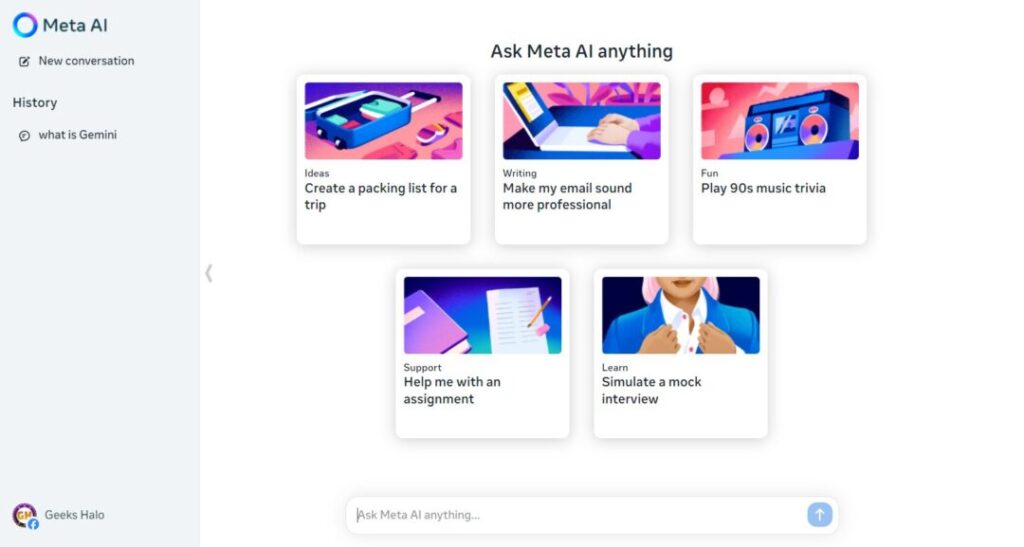
While ChatGPT has become synonymous with generating creative text formats and engaging in conversations, Meta AI, developed by Meta Platforms (formerly Facebook), takes a different approach. It’s not a direct competitor, but rather a suite of AI functionalities designed to enhance Meta’s social media applications and explore the potential of AI in various fields. Here’s why Meta AI stands out and how it complements, rather than replaces, ChatGPT:
Meta AI: A Multifaceted Approach to Artificial Intelligence
Meta AI isn’t a single LLM (Large Language Model) like ChatGPT. Instead, it’s a comprehensive research lab exploring various AI applications:
- Social Media Enhancement: Meta AI integrates with Facebook, Instagram, Messenger, and WhatsApp, offering features like improved search functionalities, content recommendations, and AI-powered chatbots for customer service. Imagine searching for a specific restaurant across all your social media platforms and getting relevant recommendations based on your past interactions.
- Augmented Reality (AR) and Virtual Reality (VR) Development: Meta AI plays a crucial role in developing the technology behind Meta’s AR and VR projects, such as the Metaverse concept. This includes AI-powered object recognition, spatial mapping, and the creation of realistic virtual environments.
- AI Research and Development: Beyond social media applications, Meta AI actively contributes to fundamental AI research. Their work spans areas like natural language processing, computer vision, and machine learning, pushing the boundaries of what AI can achieve.
Why Consider Meta AI as a Valuable Tool (Alongside ChatGPT)?
While ChatGPT excels in specific areas, Meta AI offers unique advantages that complement the functionalities of ChatGPT:
- Focus on Social Media Integration: Meta AI seamlessly integrates with existing social media platforms under the Meta umbrella (Facebook, Instagram, etc.), enhancing user experience through features like smart search and AI-powered recommendations.
- Advancements in AR/VR Technology: Meta AI is at the forefront of developing AR and VR experiences, with potential applications for gaming, education, social interaction, and even professional settings. This opens doors for innovative ways to interact with the digital world.
- Contribution to Broader AI Research: Meta AI’s research efforts contribute to the overall advancement of AI technology. Their work benefits not just Meta’s products but also the entire field of AI development.
However, there are also some things to consider:
- Limited Public Accessibility: Unlike readily available LLMs like ChatGPT, Meta AI functionalities are primarily integrated within Meta’s social media platforms and AR/VR projects.
- Privacy Concerns: Data privacy is a major concern with large tech companies like Meta. It’s important to be aware of how Meta AI collects and utilizes user data.
The Final Verdict: Working Together, Not Competing
Meta AI and ChatGPT aren’t necessarily competitors. Here’s how they can work together in your digital life:
- Use ChatGPT for Creative Exploration: If you need an LLM for creative writing, code generation, or open-ended conversations, ChatGPT is a strong option.
- Leverage Meta AI for Enhanced Social Media Experience: Enjoy the improved search functionalities, content recommendations, and AI-powered assistance features offered by Meta AI within your favorite Meta social media apps.
- Stay Curious About the Future: Both Meta AI and ChatGPT represent the exciting future of AI. Keep an eye on advancements in both areas to see how AI will continue to transform the way we interact with technology and the world around us.
13.Peppertype
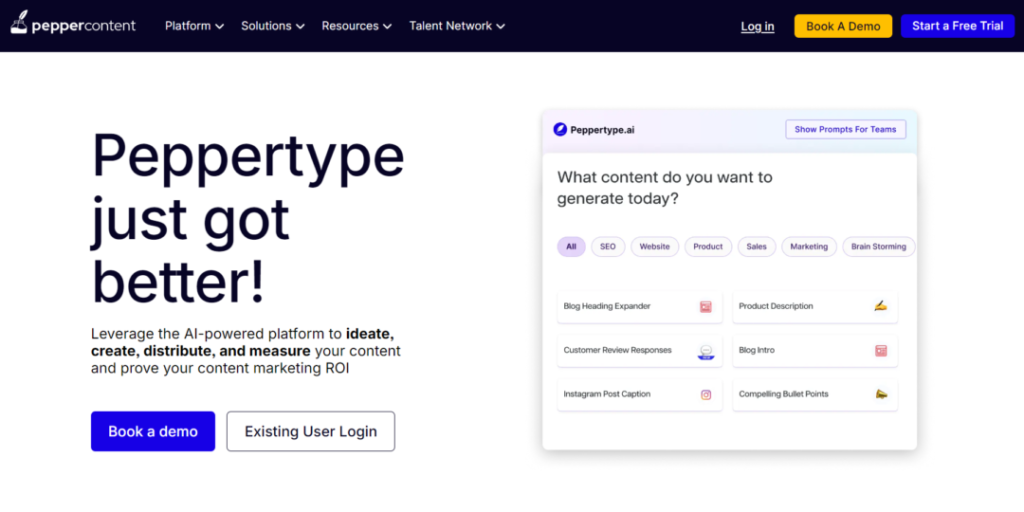
While ChatGPT has become a household name for generating creative text formats, Peppertype offers a distinct approach. It positions itself as an AI writing assistant specifically designed to help users create high-quality content efficiently. Here’s why Peppertype stands out as a top alternative for those seeking to streamline their content creation process:
Peppertype: Your AI-Powered Content Creation Partner
Peppertype goes beyond simply churning out generic text. It leverages AI to assist you in various content creation stages:
- Idea Generation: Stuck staring at a blank page? Peppertype can help you brainstorm content ideas based on keywords or topics. It analyzes existing content and trends to suggest relevant and engaging themes for your next blog post, social media caption, or marketing copy.
- Content Expansion and Rewriting: Have a good starting point but need to flesh it out? Peppertype can expand on your existing content, generate different creative variations, or even rewrite existing text in a different tone or style. This can be a valuable tool for saving time and ensuring consistency across your content.
- SEO Optimization: Want your content to rank higher in search engine results? Peppertype incorporates basic SEO optimization features. It can suggest relevant keywords and ensure your content structure aligns with search engine best practices.
- Grammar and Readability Checks: Worried about typos or grammatical errors? Peppertype acts as a built-in grammar checker, ensuring your content is polished and error-free. Additionally, it can analyze the readability level of your content and suggest adjustments to improve clarity for your target audience.
Why Consider Peppertype as a Top Alternative?
While ChatGPT excels in open-ended creative text generation, Peppertype offers unique advantages for content creators:
- Focus on Content Creation Workflow: Peppertype tackles specific pain points in the content creation process. From brainstorming ideas to optimizing for search engines, it offers a suite of functionalities designed to save you time and effort.
- Efficiency and Consistency: Peppertype helps you generate content faster, ensuring a consistent style and tone across your work. This is crucial for businesses and individuals who need to maintain a cohesive brand voice.
- Basic SEO Optimization: While not a full-fledged SEO tool, Peppertype’s basic SEO functionalities can give your content a ranking boost in search results. This is valuable for those who want to improve their online visibility without diving deep into technical SEO strategies.
However, there are also some things to consider:
- Limited Scope: Peppertype excels in content creation but might not be ideal for complex tasks like in-depth research or coding.
- Focus on Basic SEO: If advanced SEO optimization is your priority, you might need to use Peppertype in conjunction with dedicated SEO tools.
- Potential for Over-Reliance: While Peppertype is a valuable tool, over-reliance on AI-generated content can lead to a lack of originality. It’s important to maintain your own creative voice and editorial control.
The Final Verdict: Choosing the Right Tool
There’s no single “best” tool; it depends on your specific needs. Here’s a breakdown to help you decide:
- Choose ChatGPT if:
- You need an LLM for a wider range of tasks beyond content creation.
- You prioritize open-ended creative exploration and unrestricted text generation.
- Choose Peppertype if:
- You want an AI writing assistant to streamline your content creation workflow.
- You value features like idea generation, content expansion, and basic SEO optimization.
- You need help ensuring consistent style and tone across your content.
14. Julius AI
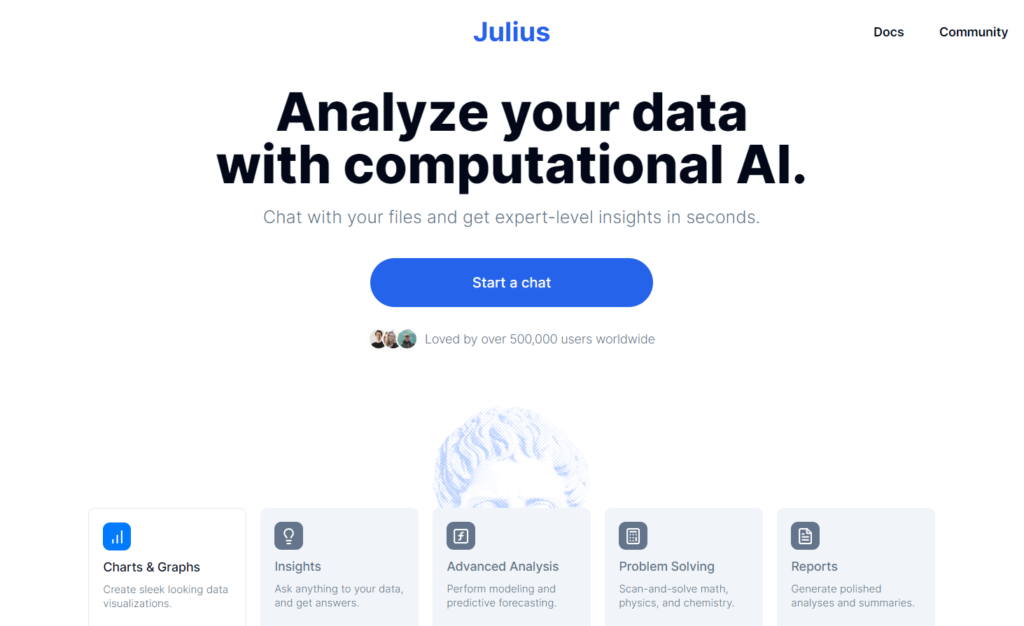
While ChatGPT has become synonymous with creative text generation, Julius AI takes a completely different approach. It’s not a direct competitor focused on crafting poems or scripts. Instead, Julius AI positions itself as your personal data analyst, empowering you to unlock insights hidden within your spreadsheets and documents. Here’s what makes Julius AI unique and why it might be the perfect alternative for those seeking a data-driven companion:
Julius AI: Your Conversational Data Analyst
Unlike some LLMs (Large Language Models) requiring complex coding knowledge, Julius AI prioritizes user-friendliness. It utilizes a conversational interface, allowing you to ask questions about your data in plain English. Imagine having a data analyst readily available to answer your queries and translate complex datasets into actionable insights.
Key Functionalities of Julius AI:
- Data Analysis and Visualization: Upload your data files (CSV, Excel, JSON, etc.) and Julius AI will get to work. It performs in-depth analysis, generates various charts and graphs, and even identifies trends and patterns within your data.
- Conversational Interface: No coding required! Ask questions about your data in plain English and Julius AI will provide clear and concise answers. This makes data analysis accessible to anyone, regardless of technical expertise.
- Advanced Analytics: Beyond basic visualizations, Julius AI can perform more complex analyses like forecasting, regression, and even basic modeling tasks. This allows you to explore deeper relationships and predictive insights within your data.
- Data Cleaning and Transformation: Don’t worry about messy data sets. Julius AI can handle data cleaning and transformation tasks, ensuring the accuracy and reliability of your analysis.
Why Consider Julius AI as a Top Alternative?
While ChatGPT excels in creative text generation, Julius AI offers a distinct advantage for those who work with data:
- Focus on User-Friendliness: Julius AI removes the technical barrier often associated with data analysis. Its conversational interface allows anyone to ask questions about their data, making it a valuable tool for non-technical users.
- In-Depth Data Exploration: Julius AI goes beyond basic data visualization. It offers advanced analytics capabilities like forecasting and modeling, allowing you to uncover deeper insights and make data-driven decisions.
- Conversational Approach: The ability to interact with your data in plain English makes Julius AI a user-friendly and intuitive tool compared to LLMs requiring complex coding or scripting knowledge.
However, there are also some things to consider:
- Limited Scope: Julius AI excels in data analysis but might not be ideal for open-ended creative tasks or general conversation.
- Accessibility: While Julius AI offers a free tier with limited functionality, unlocking its full potential might require a paid subscription.
- Focus on Structured Data: Julius AI works best with well-structured datasets like spreadsheets and CSV files. It might struggle with unstructured data like text documents or audio recordings.
The Final Verdict: Choosing the Right Tool
There’s no single “best” LLM – it depends on your needs. Here’s a breakdown to help you decide:
- Choose ChatGPT if:
- You need an LLM for creative text generation, scriptwriting, or open-ended conversation.
- Choose Julius AI if:
- You primarily work with data and require an easy-to-use tool for analysis and visualization.
- You value a conversational interface that allows you to ask questions about your data in plain English.
- You want an LLM that can perform in-depth analytics, forecasting, and basic modeling tasks.
15. Character.ai
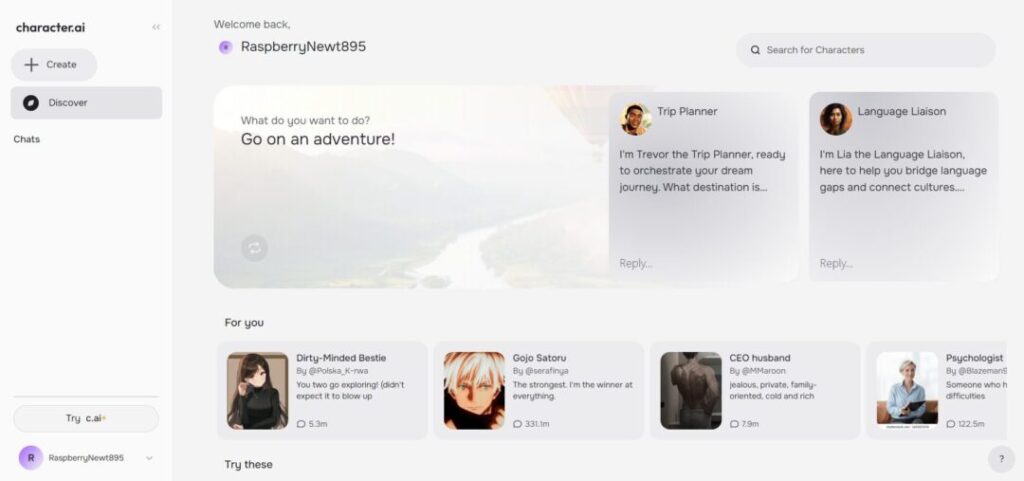
While ChatGPT has dominated the scene for creative text generation, Character.ai offers a unique twist. It allows you to have interactive conversations with fictional characters, historical figures, or even custom-made AI personas. Here’s why Character.ai stands out as a top alternative for those seeking an engaging and personalized conversational experience:
Character.ai: Where Imagination Meets Conversation
Character.ai breaks the mold of traditional LLMs (Large Language Models). It’s a web application where users can interact with a vast library of pre-built “characters” or even create their own. These characters can be anything from historical figures like Albert Einstein to pop culture icons like Spiderman, or even entirely original creations.
Key Functionalities of Character.ai:
- Engaging Conversations: Interact with your chosen character by asking questions or providing prompts. The AI responds in a way that aligns with the character’s personality and background, creating a simulated conversation experience.
- Diverse Character Library: Explore a vast collection of pre-built characters spanning fiction, history, and even current events. You can chat with philosophers, historical figures, literary characters, or even celebrities (although note these are simulations, not directly connected to the real people).
- Custom Character Creation: Feeling creative? Character.ai allows you to create your own characters, defining their personality, background, and even uploading images. This opens doors for personalized role-playing or even educational simulations.
- Community-Driven Content: The character library is constantly expanding thanks to the Character.ai community. Users can contribute their own creations and even rate and review existing characters, ensuring a diverse and ever-growing pool of options.
Why Consider Character.ai as a Top Alternative?
While ChatGPT excels in creative text generation, Character.ai offers unique advantages for those seeking an interactive experience:
- Focus on Conversation and Role-Playing: Character.ai allows you to step into a simulated conversation with historical figures, fictional characters, or even your own creations. This opens doors for learning, entertainment, and creative exploration.
- Diverse and Evolving Character Library: With pre-built characters and the ability to create your own, Character.ai offers a constantly expanding pool of conversation partners. You’ll likely find a character that piques your interest, no matter your fascination.
- Community-Driven Content Creation: The community aspect adds another layer of interest. You can contribute your own characters and see what others have created, fostering a space for imaginative collaboration.
However, there are also some things to consider:
- Limited Scope: While engaging, Character.ai conversations might not be ideal for in-depth research or complex tasks like code generation.
- Accuracy and Consistency: Since characters are user-created, the level of accuracy and consistency can vary. It’s important to approach conversations with a critical eye.
- Potential for Misinformation: With user-generated content, there’s always a risk of encountering misleading or inaccurate information. Be mindful of the character’s source and the potential for biases.
The Final Verdict: Choosing the Right Tool
The ideal LLM depends on your specific needs. Here’s a breakdown to help you decide:
- Choose ChatGPT if:
- You need an LLM for a wider range of tasks beyond conversation and character interaction.
- You prioritize open-ended creative text generation and tasks requiring factual accuracy.
- Choose Character.ai if:
- You seek an engaging and interactive conversation experience with fictional characters or historical figures.
- You value a diverse and ever-growing character library, with the option to create your own.
- You enjoy exploring the creative potential of AI-powered role-playing and conversation simulations.
16. HuggingChat
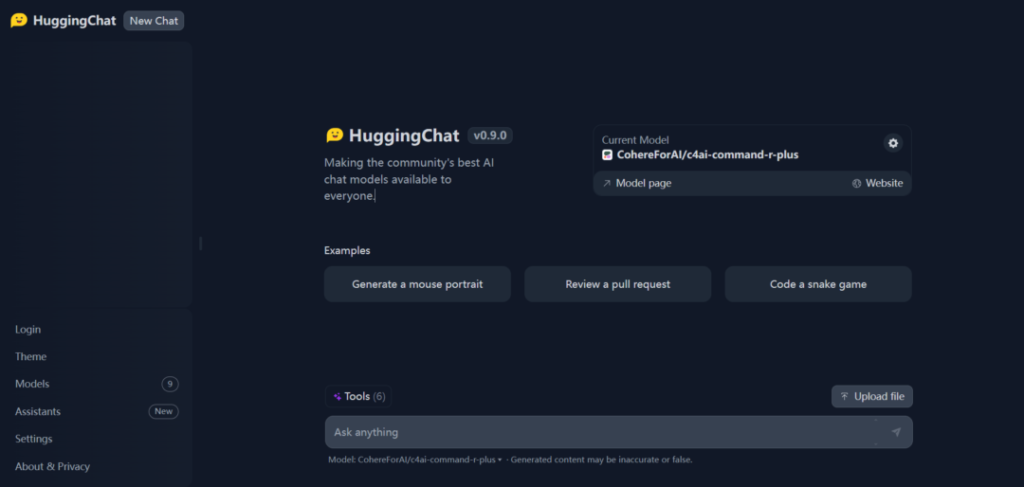
HuggingChat is a free, open-source chatbot developed by Hugging Face, a platform known for its vast repository of AI models and tools. It’s often touted as an alternative to ChatGPT, but it’s more accurate to say they offer different approaches to AI-powered conversation.
HuggingChat: Open-Source Conversation with a Community Focus
HuggingChat utilizes the LLaMA model (developed by Meta AI) to engage in natural language conversations on various topics. Unlike ChatGPT, which is a closed-source platform, HuggingChat prioritizes open-source development and community involvement. This means:
- Transparency and Accessibility: The code and underlying model are open for anyone to inspect, modify, and contribute to. This fosters collaboration and allows developers to build upon existing work.
- Community-Driven Learning: Hugging Face provides a vibrant community where users can discuss their experiences, share tips, and help each other improve the capabilities of the chatbot.
- Continuous Improvement: With open-source development, the model can be constantly refined and updated based on user feedback and community contributions.
Why Consider HuggingChat as a Valuable Tool?
While ChatGPT excels in specific areas like creative text generation, HuggingChat offers unique advantages:
- Open-Source Philosophy: HuggingChat promotes transparency and accessibility in AI development, making it a valuable tool for those interested in understanding and contributing to the field.
- Community-Driven Learning: The collaborative environment fosters knowledge sharing and learning, offering valuable insights and support for those working with AI.
- Constant Evolution: The open-source nature allows for continuous improvement and adaptation based on user feedback and community contributions.
However, there are also some things to consider:
- Limited Scope: HuggingChat is still under development and might not be as advanced as ChatGPT in terms of creative text generation or factual accuracy.
- Technical Knowledge: While user-friendly, understanding the open-source nature and potential for community-driven changes might require some technical awareness.
- Data Access: HuggingChat’s model is trained on publicly available data, which might limit its access to the latest information compared to ChatGPT’s potentially broader dataset.
The Final Verdict: Choosing the Right Tool
The ideal LLM depends on your specific needs. Here’s a breakdown to help you decide:
- Choose ChatGPT if:
- You need an LLM for specific tasks like creative writing, code generation, or scriptwriting.
- You prioritize a user-friendly interface and straightforward approach to text generation.
- Choose HuggingChat if:
- You value open-source development, transparency, and accessibility in AI.
- You enjoy the collaborative and learning environment fostered by the Hugging Face community.
- You want to contribute to the development and improvement of AI models.
17. IBM Watson Assistant
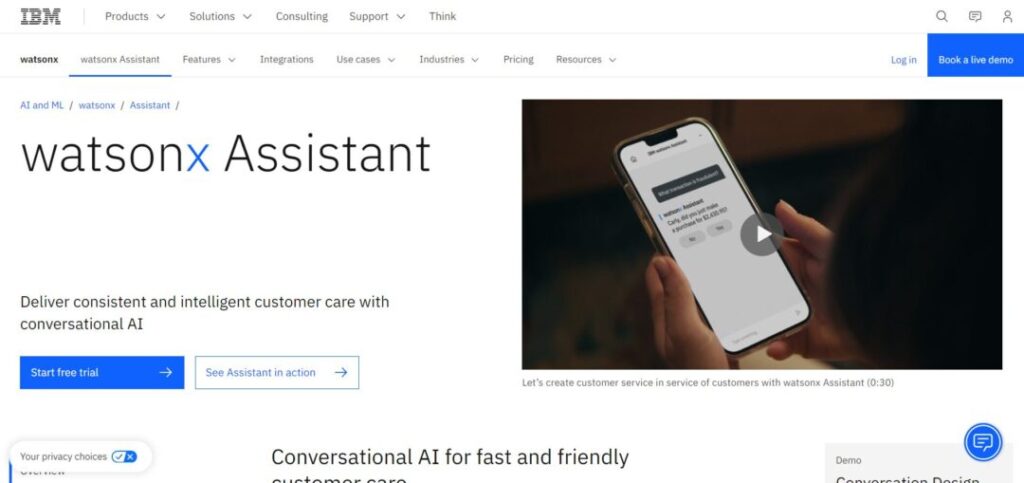
IBM Watson Assistant is a powerful tool for building and deploying chatbots, but it’s not a direct competitor to ChatGPT in the way you might think. While both involve AI-powered conversation, they serve different purposes and have distinct strengths:
IBM Watson Assistant: Tailored Chatbots for Business Needs
Developed by IBM, Watson Assistant is a platform specifically designed for businesses to create and manage chatbots that integrate seamlessly with various channels like websites, mobile apps, and messaging platforms.
Key Functionalities:
- Customization: Watson Assistant allows you to build chatbots tailored to your specific needs and industry. You can train them on your own data and integrate them with existing systems for a seamless user experience.
- Focus on Task Completion: Watson Assistant excels at handling specific tasks like answering FAQs, providing customer support, and completing transactions. It’s designed to be informative, efficient, and reliable.
- Security and Compliance: Built with enterprise-grade security and compliance in mind, Watson Assistant is ideal for businesses that need to handle sensitive information.
Why Consider Watson Assistant as a Valuable Tool?
While ChatGPT excels in creative text generation, Watson Assistant offers unique advantages for businesses:
- Tailored Chatbot Development: Watson Assistant empowers you to build chatbots that perfectly align with your brand and customer needs.
- Focus on Task Completion: It excels at handling specific tasks and providing accurate information, making it ideal for customer service and internal workflows.
- Security and Compliance: Businesses can trust Watson Assistant for its robust security features and adherence to data privacy regulations.
However, there are also some things to consider:
- Limited Scope: While customizable, Watson Assistant might not be ideal for open-ended creative tasks or casual conversation.
- Technical Knowledge: Building and managing complex chatbots might require some technical expertise or collaboration with developers.
- Cost: Watson Assistant has different pricing tiers depending on your needs, which might be a factor for some businesses.
The Final Verdict: Choosing the Right Tool
The ideal LLM depends on your specific needs. Here’s a breakdown to help you decide:
- Choose ChatGPT if:
- You need an LLM for creative text generation, scriptwriting, or open-ended conversation.
- You prioritize a user-friendly interface and a more general-purpose AI tool.
- Choose Watson Assistant if:
- You want to build and deploy chatbots for specific business needs and integrate them with existing systems.
- You value task completion efficiency, accuracy, and security.
- You need an LLM that adheres to strict compliance and data privacy regulations.
18. Codeium
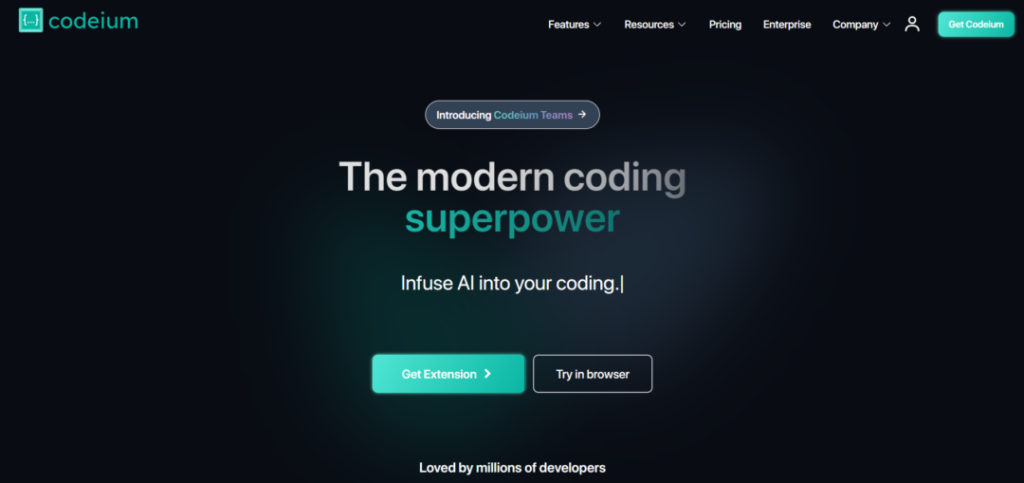
Codeium is a powerful AI-powered tool specifically designed for developers, offering functionalities beyond ChatGPT’s capabilities. While both utilize AI, they cater to different needs:
Codeium: Your AI Coding Companion
Codeium acts as a developer’s AI assistant, helping them write code faster and more efficiently. It integrates with popular IDEs like VS Code and JetBrains, offering real-time assistance within your coding environment.
Key Functionalities:
- Intelligent Code Completion: Codeium analyzes your code context and suggests relevant code snippets as you type. This saves time and reduces errors.
- Natural Language Understanding: Write comments in plain English, and Codeium translates them into code, making it easier to express your ideas.
- API Discovery and Integration: Find and integrate APIs directly within Codeium, streamlining the process of using external services.
- Unit Test Generation: Generate unit tests automatically, ensuring your code is well-tested and reliable.
Why Consider Codeium as a Valuable Tool?
While ChatGPT excels in creative text generation, Codeium offers unique advantages for developers:
- Focus on Code Development: Codeium is specifically designed to assist with coding tasks, making it a valuable tool for developers of all skill levels.
- Real-Time Integration: Its seamless integration with popular IDEs allows for immediate assistance within your workflow.
- Natural Language Understanding: Expressing your coding ideas in plain English makes the process more intuitive and efficient.
However, there are also some things to consider:
- Limited Scope: While powerful for coding, Codeium might not be ideal for general-purpose AI tasks like creative writing or open-ended conversation.
- Technical Knowledge: Understanding how to use Codeium effectively might require some familiarity with coding concepts and IDEs.
- Potential for Errors: Like any AI tool, Codeium’s suggestions might not always be perfect. It’s crucial to review and validate the generated code.
The Final Verdict: Choosing the Right Tool
The ideal LLM depends on your specific needs. Here’s a breakdown to help you decide:
- Choose ChatGPT if:
- You need an LLM for creative text generation, scriptwriting, or open-ended conversation.
- You prioritize a user-friendly interface and a more general-purpose AI tool.
- Choose Codeium if:
- You’re a developer looking to write code faster and more efficiently.
- You value real-time assistance within your IDE and the ability to express coding ideas in plain English.
- You want an AI tool specifically designed for coding tasks and API integration.
Conclusion
As we reach the conclusion of our exploration into the 18 best ChatGPT alternatives in 2024, it is clear that the field of conversational AI has grown exponentially, blossoming into a varied terrain of highly specialized and innovative tools. Each alternative we’ve discussed brings its own unique strengths to the table, from Jasper’s content creation prowess and Microsoft Copilot’s seamless integration within professional productivity suites, to the research-centric abilities of Perplexity AI.
The diversity of these tools doesn’t just reveal the evolving sophistication of these models but also the breadth of our own needs as users. We’ve seen platforms that excel in business analytics, creative writing, customer service, and even nuanced areas like legal advice and healthcare. The richness of choice allows individuals and businesses to select an AI companion that resonates most closely with their specific goals, workflows, and aspirations.
The key takeaway here is not to find a one-size-fits-all solution but to recognize the right tool that fits into the puzzle of your personal or corporate landscape—like a bespoke piece tailored to smooth out the edges of your daily challenges. The best ChatGPT alternative for a content marketer might be miles apart from what a data analyst needs. Our journey through these AI platforms emphasizes the beauty of tailored technology and the importance of choosing tools that align with our unique missions.
In 2024, as we stand on the cusp of technological revolutions, the real winners are not the tools but we, the users. Equipped with the knowledge of what’s out there, we can now harness the collective power of these AI advancements to elevate our potential, automate the mundane, innovate in our respective fields, and enhance our decision-making processes.
The landscape of AI-driven communication and information processing is vast and ever-growing. As it continues to expand and diversify, staying informed and agile in our choices will ensure we remain at the cutting edge, deriving the best that AI can offer. Whether you’re looking for a creative sidekick, a research assistant, a productivity booster, or a new way to interact with the digital world, the universe of ChatGPT alternatives has something for everyone. So choose wisely, embrace the possibilities, and let these tools propel you towards more efficient, creative, and intelligent horizons.


